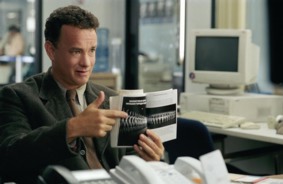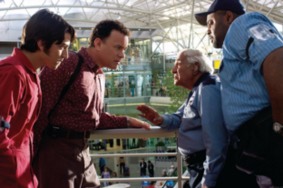|
Ever since Spielberg’s concerted wadings
into more Oscar-worthy waters, his work has been infuriatingly
inconsistent. Heeding David Lean's career advice ('Never
emerge from the same hole…'), Spielberg has made eclecticism
his watchword. Staying away from comedy was his wife Kate
Capshaw's idea (he was lined up to direct Meet the
Parents) so perhaps Kate has relented and finally
let her illustrious hubby have a crack at whimsy. That's
comedy eliciting gentle smiles rather guffaws. Hindered
by their mythic status in Hollywood, a new Spielberg comes
under scrutiny more than the work of any other director.
In as much as it is possible to bypass the celebrity and
see The Terminal as an ordinary movie,
it is (I'm afraid) a very ordinary movie.
Based
partially on the sad fate of a red taped, stranded Iranian
at Charles De Gaulle airport, The Terminal is the story of a nice guy stuck at JFK due to a civil war
in his fictitious land of Krakozhia. At the crack of a gun,
he becomes a no one, a citizen of nowhere. We just know that
this ordinary man will touch the lives of all who cross his
path and he will achieve his goal and make us all feel good
about life while out in the real world children are now the
next victims of terrorist avengers. Yes, it's a shitty world
but The Terminal is more a placebo than a
real escapist feel-good tale. Spielberg may have had the best
intentions in saying that because the world is in such a state,
it needs Hollywood (read escapism) more than ever. Is it me
or was that remark utterly crass (as crass as his clutching
his Oscar in Austin Powers Goldmember as
proof of his directorial ability).

Is
it furthering audience delight to base a light, fluffy movie,
a piece of Amaretti paper (which combusts as readily) on a
real life case with elements of real tragedy (I mean the Iranian
guy is effectively imprisoned)? Sure, if you buy him off.
Hollywood is a major contributing force to those who see America
in a dim light. It was foolish of Spielberg to allude to global
politics seeing as he enjoys the extraordinary privilege of
being one of the world's billionaires. But then he wasn't
born into great wealth so his movies must speak to the many…
Well they used to, back in the days when thrilling an audience,
making them go 'Oooh!' and scaring the shit out of them was
a top priority. Now, he's in the game for what interests him
and sadly he's choosing scripts that seem awfully thin. There
is nothing wrong with The Terminal. It's
just that it's directed by the man who gave us Jaws and Raiders of the Lost Ark. He
set his own bar so high that even he cannot see over it anymore.
Hanks
is Viktor, one in a long tradition of cuddly immigrants who
is forced to make the terminal his home for about nine months.
The movie highlights his battle of wits with the guy in charge
(Stanley Tucci) who is dying to get rid of the unsightly,
bureaucratically trapped visitor because he wheel-spokes his
sterile running of the airport. Along the way, Hanks makes
friends and falls in love (Catherine Zeta-Jones as a married
man's lover who cannot let go) and fashions areas (Gate 67)
to serve as his living quarters. It's all terribly twee and
probably would have been a classic if it had been made in
1949 at Ealing Studios directed by Alexander MacKendrick.
But
it's post-9/11 Spielberg and he will CHARM you (goddamnit)
in capital letters. Alas, no. There are actually pratfalls,
people slipping over on polished floors. That was very funny
but in 1930. It's almost embarrassing here. There is an early
scene that is so dumb it's almost like the writers decided
to take a break from their obvious intelligence. You have
a man whose command of English is limited to what he has to
say to get to his destination. He cannot engage in any conversation
unless he is required to answer 'yes' which he does often.
Tucci explains the situation, informing Hanks that he is stuck
here. Hanks, very obviously, understands not a single word.
So what do the screenwriters have happen next? Tucci explains
it again slightly differently (and unnecessarily violently
with an apple and a packet of tortillas). He and his security
guard (who has the most saccharine moment in the film) talk
to Hanks when they both know he cannot understand a word.
It's so frustrating when a movie goes dumb. It's not as if
the exposition was important enough to be repeated. We got
it already. It's the cinematic equivalent of SHOUTING at those
who do not understand English.
The
best moment - which will go unnoticed by most of its audience
- is a tiny moment akin to the wooden hand in the underachieving
live action remake of Thunderbirds.
Hanks is in a bookshop clutching a slim children's book, the
cover of which will no doubt be recognised by fans of Dr.
Seuss. As he turns a corner with Zeta Jones, the book vanishes
from his hand - a rare continuity error that screams 'deleted
scene' for the DVD. The book is ironically titled given Hanks'
situation. It is 'Oh, The Places You'll Go' and if that level
of subtlety had been a vein running through the film then
perhaps I would have appreciated it more.

I
will say that the practical details of how a man with no money,
no English, and no recourse but the concourse survives in
the ultimate shopping mall are handled deftly. He gets a series
of jobs, the first (for airline food trays as payment, lucky
man) is to find out as much as he can about the captivating
immigration official, Zoe Saldana, who daily stamps DENIED
on his forms. The lowly airport worker who hired the Krakozhian
match-maker, armed with Hanks' hard won intelligence, wins
Zoe's heart and also demonstrates how deeply Star Trek has folded into the American culture. It's a sweet B story,
unbelievably unbelievable but hey, Next up on the earning
tree of everyone's favourite immigrant is a building chief
who's impressed with Hanks' own handiwork at Gate 67. Hanks
is some sort of expert builder and gets an under the table
cash in hand job doing building work. So with $760 a week
coming in (with no taxes to pay) Hanks regains some dignity
in the surreality of his surroundings.
So
why is Hanks in New York in the first place? The reason is
charming in its own way (but absurdly sentimental the way
Spielberg presents it) but this at least gives the film a
jolt of momentum after we finally found out what's in the
peanut can. Hanks is also a hero who is buffeted by the actions
and inactions of others. He's never really the architect of
his own destiny. The friend who enables Hanks to miss his
deporting flight home does so in an absurdly over dramatic
way effectively sentencing himself to a seven year prison
stretch. Boy, Hanks must have made a really good friend in
those nine months. For whom would you go to prison for seven
years? And when you're an old man to start with?
The
only dangerous scene in the film is one in which Hanks helps
out a fellow Balkan who threatens to cut his own throat if
he is not allowed to take medicines back to his father. Hanks
helps him out by seeing the human equation, knowing the rules,
bending them and becoming a Terminal hero for all those faces
that stare out from behind shop counters and burger bars.
In a rare surprise, Tucci's boss too advocates the human touch
when officials' lives are usually ruled by regulations that
turn people into petty control freaks.
The
two hour plus running time doesn't drag because it's a 'nice'
film with all that that implies. Ever been called 'nice' by
anyone? Boy, it smarts! But in the final analysis, (as Robert
de Niro once wisely credited his extraordinary career) it's
all in the choices. Spielberg is capable of great cinematic
sweeps, sleight of hand and genuine thrills. It's just that
whoever he was when fish and fedoras were in the scripts,
seems to have wandered away leaving the 'what shall I do next?'
Spielberg in charge. That’s a great loss.
I
do not anticipate great things in his next War
of the Worlds (CGI? SchmeeGI) and
am frankly dismayed by the idea of him taking on terrorism.
He is rumoured to be making a film on the 1972 Olympic kidnapping
and killing of nine Israeli athletes (on 6th September, a
favoured month for atrocity it seems). Schindler's
List was worthy and heartfelt. What can Steven possibly
say about terrorism?
|